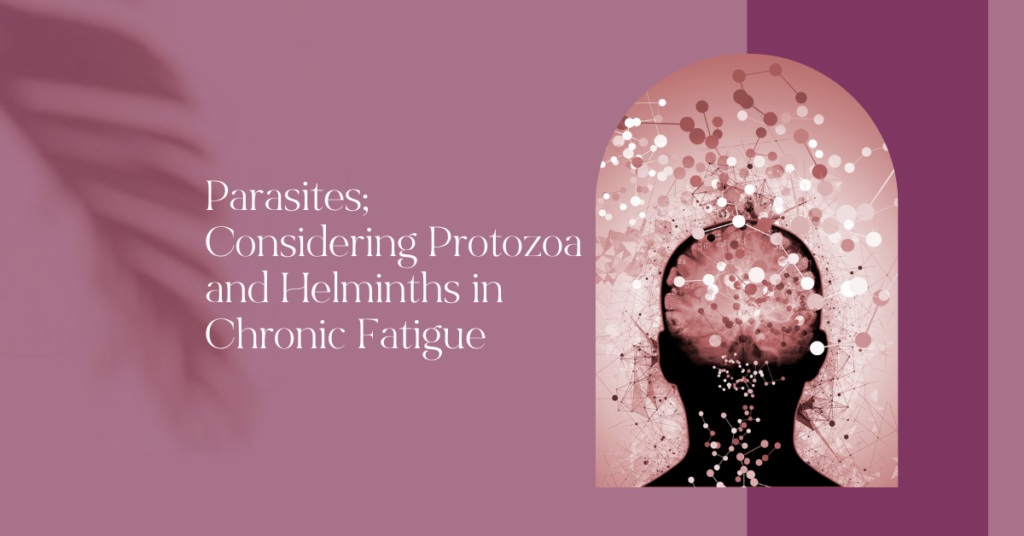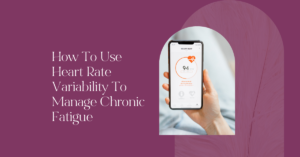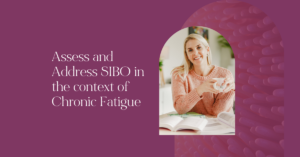Helminths and Protozoa are infections that can impact and contribute to Chronic Fatigue. Here I discuss intestinal helminths and protozoa, possible symptoms, how to test for them and how to consider treating them (if at all), alongside your Chronic Illness journey.
Different Types of Parasites
This blog will focus on intra-intestinal parasites, but here are some additional examples of parasitic infections.
| Ectoparasites | Protozoa | Helminths | Entamoeba and Babesia Microti |
| Feed off the hosts and are also a vector for spreading other pathogens | Host within intestinal environment | Host within intestinal environment | Host in extraintestinal tissues e.g. infected gyms, infect red blood cells |
| Mosquitos (Malaria) Ticks (Babesiosis) Mites Lice | Balantidium coli Blastocystis spp. Chilomastix mesnili Cryptosporidium spp. Cystoisospora spp. Dientamoeba fragilis Entamoeba spp. GiardiaIodamoeba buetshlii Trichomoniasis | Roundworm Tapeworm Flatworms / Flukes |
Protozoa
Some protozoa are symbiotic and live in mutually beneficial relationships with other organisms, while others are parasitic and can cause diseases in humans, animals, and plants.
One of the biggest impacts of Protozoa is how they may negatively impact the gastrointestinal lining by:
- Inhibiting brush border enzymes
- Attracting mast cells and dendritic cells
- Disrupting of tight junctions
- Generating cell arrest and apoptosis
- Impacting intestinal motility
- Increasing mucus secretion
- Changing the composition of the normal bacterial flora
Helminths
Helminth infections, also known as helminthiasis or worm infestations, are prevalent in many parts of the world, particularly in areas with poor sanitation and limited access to clean water.
They can be acquired through ingestion of contaminated food or water, contact with contaminated soil, or through direct contact with infected animals or people.
Helminths are less destructive on gut tissue when compared to protozoa but they will deplete nutrients and compromise the immune system.
Helminths can spread through the entire body and activate the TH2 pathway of the immune system, turning on allergies and asthma. Symptoms may vary depending on the location of the infection. Common symptoms may include:
- Abdominal pain
- Diarrhoea
- Nausea
- Fatigue
- Weight loss
- Anaemia
Helminths are controversial as they may have some protective properties. The increased TH2 activity may help to counterbalance the very active TH1 activity in autoimmunity. Therefore, if someone has an autoimmune condition, they may want to have some hesitancy towards addressing helminths as this could potentially cause a flare.
How are we exposed?
When I did my first Nutritional Therapy Degree back in 2008/2009, we were taught to ask our clients about foreign travel. Implying that someone would only be exposed to things like parasites if they had travelled to a third world country.
However, this simply isn’t true.
Parasites are in fact incredible common, there just isn’t efficient screening for them, which we will discuss more under testing.
The number one exposure to parasites and protozoa in the developed world is via seafood and salads mostly through food handling.
Other common exposures are:
- Pets: pet to human through the handling of faeces and open wounds
- Contamination in parks, playgrounds and at the beach
- Footwear
- Gardening / Dirty fingernails
- Waterborne transmission
- Lakes, rivers and swimming pools
- Public pools – certain infections may be chlorine resistant
- Small infections can penetrate water treatment systems
How Parasites and Protozoa Impact the Immune System
Opportunistic Infection
We have lived alongside other organisms for the whole history of human existence. There are some schools of thought that certain infections, for example helminths, may have a beneficial effect on the immune system. A different opinion is that these infections can be asymptomatic and someone who has a robust immune system will be able to clear them without the need for external assistance. However, we cannot always rely on a robust immune system, especially when working through the complexity of chronic fatigue and chronic illness. Someone with a compromised immune system may be more susceptible to infections, struggle to get rid of them and experience more symptoms as a consequence. We may want to help the body clear the infection however, we may not want to be too heavy handed with protocols and supplements to eradicate the infection until we have done the due diligence to support the immune system.
Latent Infection
A latent infection is when an infection is hidden from the immune system and can be dormant for weeks, months and years. Infections can hide in biofilms which is a mucosal layer that can form around organisms such as yeast, fungi, bacteria and parasites. Biofilm can prevent the immune system from sensing the infection and it is also a reason why some gut infections may go undetected even with comprehensive stool testing.
A latent infection may become active when the immune system becomes compromised. For example, someone could have a latent tapeworm infection which only becomes problematic after a bout of food poisoning and a period of high emotional stress.
Once a latent infection has become activated, we may want to eradicate it. However, the priority would be to bolster the immune system either before or alongside eradication.
Slow Infection
A slow infection is an infection that has a long incubation period followed by progressive disease over time. It will gradually become more problematic over the course of weeks, months or years. The nature of a slow infection makes it hard to identify because there can be a disconnection between a trigger event (eg.foreign travel) and the onset of symptoms.
We are more susceptible to slow infections as the immune system ages; known as immune senescence. We all experience a natural decrease in immune function and an impaired ability to respond to pathogens as we age. However, there are diet and lifestyle factors that we can use to slow the ageing process and sustain a higher degree of immune competence.
Chronic Infection
Parasitic infections, particularly protozoa, can disturb and decrease mucosal immunity which can make some more susceptible to reinfection with further parasitic infections on exposure. I large part of managing chronic parasitic infections to focus on strengthening the gut mucosal immunity.
Asymptomatic or Symptomatic?
It is possible for humans to live in synergy with parasites and protozoa as many can be asymptomatic. Whether or not we address possible or known parasites and protozoa is a decision that I make on a case by case basis – also keeping in mind that even if it is something we want to address, that there may be other things that need to take priority first.
Any infection has the potential to:
- Activate a pre-existing injury or weakness in the body
- Increase systemic inflammation in the body
- Increase neuroinflammation in the brain and activate primed glial cells
- Trigger or perpetuate autoimmunity
- Deplete antioxidants
- Disturb the microbiome
- Uncouple mitochondria, preventing adequate ATP production
Therefore, in the case of chronic fatigue and chronic illness, we must consider that parasites and protozoa may be contributing towards symptoms. However, we cannot know for sure. Sometimes we only get the feedback by creating a plan to address the infection and tracking symptoms improvements thereafter.
Clinically, when I make this decision with my clients, there is a noticeable improvement in symptoms.
Testing
Stool Testing
You can test for parasites and protozoa using stool testing. More specifically Polymerase Chain Reaction (PCR), which is a DNA based testing method, and Microscopy.
My preferred test is the Comprehensive GI Effects Stool Test by Genova Diagnostics which retails at about £360 and needs to be ordered through a registered practitioner.
It relies on 3 stool samples collected over 3 consecutive days which increases the chances of finding stealth infections.
However, because infections like to hide in biofilm, a negative result does not necessarily rule out parasites and protozoa.
As an insurance policy in clinical practise I work as follows:
- Do the groundwork to support the clients immune and overall digestive system
- Address known infections revealed by testing
- Use a Full Moon Parasite Cleanse by Cell Core (UK link, US link) once all other work has been completed or if we hit a dead end.
Full Blood Count
A full blood count, specifically elevated eosinophils (>3%), could suggest a parasite infection, however, this is more of a clue than a definitive marker.
Anecdotally in practice, I have seen several clients with elevated eosinophils and high histamine symptoms have very successful Full Moon Parasite Cleanses.
Immune Suppression and Parasites
A big part of dealing with infection in chronic fatigue and parasites and protozoa specifically is supporting the host’s immune system. This can be simple in some cases and more complex in others depending on the individual’s unique makeup and challenges.
Anything that weakens the T cells and B cells of the immune system will impact the body’s ability to clear a parasite. Things to consider include:
- Overtraining; we wouldn’t think this is the case for someone with chronic fatigue but this is relevant to the system and the amount of oxidative stress being produced. If we exercise or move more than our body will allow, we are overtraining.
- Bone Marrow Suppression; impacted by radiation, severe inflammation or malignancy
- Chronic viral infections
- Sleep disorders
- Malnutrition of proteins, fats, vitamins ADEK, Iron, Copper, Zinc, Vitamin B and Vitamin C
- Autoimmune diseases
- Use of corticosteroids
Additionally we want to avoid things that could negatively impact the gut microbiome:
- Limited diversity in the diet
- Living in extremely sterile environments
- Poor sleep
- Poor circadian rhythms
- Sedentary lifestyle and lack of appropriate movement
- Antibiotics and NSAIDS (non-steroidal antiinflammatory drugs)
- Pesticides
- Artificial sweeteners
Nutraceuticals that Aid Parasite Removal
Top PIcks Are:
- Wormwood
- Black walnut
- Olive Leaf
- Garlic Extract
Anti-parasitic nutraceuticals work by hindering the growth, protein synthesis and/or DNA replication of the parasite But the immune system still needs to kill the parasite. Therefore, we need to do our due diligence and support the immune system, including the gut mucosal immune system, prior to aggressive antiparasitic treatment.
This starts with basic foundations:
- Sleep
- Stable Blood Sugar
- Macro-nutrition; High quality diet with adequate protein intake (1g per pound of ideal body weight) and intake of essential fatty acids (omega 3 fatty acids)
- Micro-nutrition; vitamins ADEK, Iron, Copper, Zinc, Vitamin B and Vitamin C
- Optimal digestive health which we can encourage with things like probiotic, saccharomyces boulardii, short chain fatty acids and mucosal membrane support
- Optimal movement routine within capacity (see here & here for guidance)
- Nervous System Support and stress management










